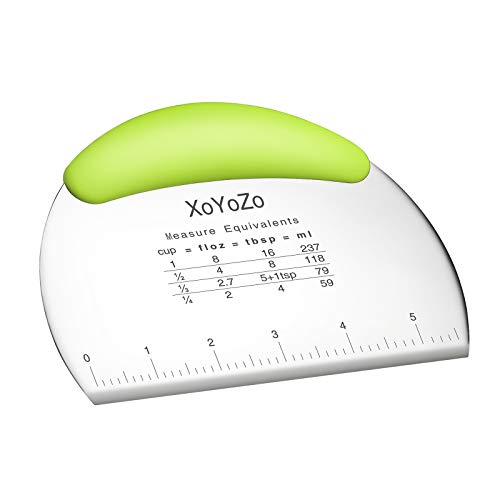
Ms Wgo Dough Cutter
| Pros | Cons |
|---|---|
|
|
Our content is meticulously curated through independent research, testing, reviews, and AI-driven recommendations, all designed to present you with the finest product choices. When you make a purchase through our links, it could result in us earning a commission.

Whether you’re a keen baker who enjoys creating masterpieces or just love baking pizza, a dough cutter is a must. A valuable addition to any baker’s kitchen, a dough cutter helps speed up your workflow and create flawless dough every time. With its sharp blade, this handy tool slices through even sticky or frozen dough. It also can be used for slicing fruits, icing cakes, mixing chopped veggies, and even more! But with so many available, how do you know which is right for you? Below, we’ve assembled the best dough cutters of 2024, with the MS WGO Dough Cutter as our top pick. Let's take a look!
A high-quality dough cutter is a must-have in any kitchen, especially if you're into making homemade bread or pasta. But, with so many different types of dough cutters available, it can be challenging to choose the right one. That's why we've put together a comprehensive guide that covers everything you need to know about these kitchen tools. Our guide includes information on the different types of blades and materials used in construction, as well as tips on how to choose the right size and shape for your needs. With our help, you'll be able to confidently pick the perfect dough cutter for your baking adventures. So, take a look at our guide and get ready to enjoy perfectly sliced and shaped dough!
A scraper cutter is one of the most commonly used dough cutters. It consists of a metalhead with either a flat or curved surface. The head is mounted on an arched cushioned handle which allows you to scrape the dough off of surfaces or cut soft dough into portions without damaging it. This type of cutter is often used in restaurants and bakeries for cutting pizza, pies, and pastries.
Wheel cutters, also called pizza cutters, are used to cut the thinly rolled dough into strips and shapes. Commonly made of stainless steel with a plastic handle, the wheel is mounted on an axle that allows it to turn in place, slicing through the material beneath. The wheel can shape the dough into various configurations depending on the task at hand. For instance, you can swap the wheel with a scalloped shape or a curvy one to create a raised pattern on the dough.
A pastry blender, also known as a pastry cutter, is another essential tool in a baker's kitchen. It consists of a handle with numerous parallel blades at different angles. The cutter aids in mixing butter with the flour and breaking up clumps of butter and oil while making flaky doughs, such as croissants, puff pastry, and many types of pie crusts.
The material of the cutter is the first thing you should consider as it determines the durability and longevity of the product. Dough cutters are available in both stainless steel and plastic. Stainless steel cutters are practically indestructible, resist corrosion, and can double as a knife for cutting vegetables and nuts, but you should keep in mind that they don't offer much flexibility. For instance, you cannot use them on non-stick pans or scrape the mixing bowls. Plastic, on the other hand, offers the flexibility of mixing the ingredients, cutting the soft dough, and scraping the bowl, but it isn't durable and can easily slip out of hand while performing a task. Your best bet is heavy-duty stainless steel, as you can always use a spatula to scrape the bowl.
Every professional baker knows that the dull blades of knives and cutters can turn any dough into a sticky mess. Therefore, you should opt for a cutter with sharp blades to cut through the tough dough in one swift motion. A sharp blade also ensures that your work is effortless; you won’t have to push down hard on your dough to cut it properly.
When you’re kneading dough and working with a lot of butter, your hands are bound to get greasy and slippery. Therefore, it is important to look for a cutter that has an ergonomically designed handle with a well-cushioned grip so your hand won't slip or get strained while performing the task.
The delicate alchemy of baking relies on accuracy and precision, so if you are a keen baker or professional chef, you should consider the dough cutter with measurement markings etched on it. These measurement markings will eliminate the need for a measuring scale and can also act as a quick reference, allowing you to prepare your favorite cookie recipe with confidence every time.
A dough cutter is a must-have tool in any kitchen. Follow these steps to keep your dough cutter in tip-top shape and always ready for your next bake:
A dough cutter can cost anywhere from $10 to $50, depending on the material, size, and brand. A simple dough cutter with a sharp blade and cushioned grip can cost around $15. The more advanced models come with riveting blade technology and intricate, interchangeable blades and attachments such as an attachable bottle opener or a corkscrew.

| Pros | Cons |
|---|---|
|
|

| Pros | Cons |
|---|---|
|
|

| Pros | Cons |
|---|---|
|
|

| Pros | Cons |
|---|---|
|
|